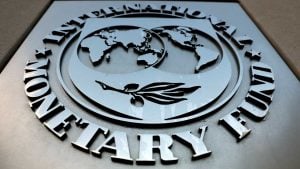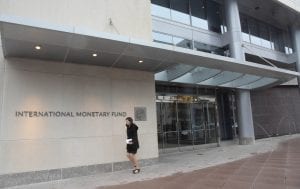IMF raises India’s FY25 growth forecast to 6.8%; pegs global growth at 3.2% in 2024, 2025

KV Prasad Jun 13, 2022, 06:35 AM IST (Published)
 Listen to the Article (6 Minutes)
Listen to the Article (6 Minutes)
Summary
Although the IMF has revised India’s growth forecast up, it still trails the Reserve Bank of India’s estimate of 7% growth in FY25. Thereafter, the IMF sees India’s growth slowing to 6.5% by FY26, at the same level as its previous update in January.
The International Monetary Fund (IMF) has raised India’s growth forecast for the current fiscal year by 0.3 percentage points to 6.8%, compared with its earlier January update. The latest projections were part of the IMF’s World Economic Outlook update for April.
Although the IMF has revised India’s growth forecast up, it still trails the Reserve Bank of India’s estimate of 7% growth in FY25. Thereafter, the IMF sees India’s growth slowing to 6.5% by FY26, at the same level as its previous update in January.
“Growth in India is projected to remain strong at 6.8% in 2024 and 6.5% in 2025, with the robustness reflecting continuing strength in domestic demand and a rising working-age population,” the IMF said in its report.
The IMF sees India’s consumer price inflation cooling off from an average of 5.4% in FY24, to 4.6% in FY25, and further to 4.2% in FY26.
The inflation projections are marginally higher than Reserve Bank of India (RBI) estimates, which pegs FY25 consumer inflation to average 4.5%.
Global Outlook
The IMF said in its report that the global economy remains remarkably resilient, with growth holding steady as inflation returns to target.
Global growth, estimated at 3.2% in 2023, is projected to continue at the same pace in 2024 and 2025, the IMF said in its report. The forecast for 2024 is revised up by 0.1 percentage point from the January World Economic Outlook Update.
“Despite gloomy predictions, the global economy remains remarkably resilient, with steady growth and inflation slowing almost as quickly as it rose. The journey has been eventful, starting with supply-chain disruptions in the aftermath of the pandemic, an energy and food crisis triggered by Russia’s war on Ukraine, a considerable surge in inflation, followed by a globally synchronised monetary policy tightening,” said Pierre-Olivier Gourinchas, Chief Economist at the IMF.
“Even more encouraging, we now estimate that there will be less economic scarring from the pandemic—the projected drop in output relative to prepandemic projections—for most countries and regions, especially for emerging market economies, thanks in part to robust employment growth. Astonishingly, the US economy has already surged past its prepandemic trend,” the IMF said in its report.
The IMF’s latest forecast for global growth five years from now—at 3.1%—however, is at its lowest in decades, the agency warned.
Advanced economies are expected to see growth rise slightly, with the increase mainly reflecting a recovery in the euro area from low growth in 2023, whereas emerging market and developing economies are expected to experience stable growth through 2024 and 2025, with regional differences, as per IMF.
For advanced economies, growth is projected to rise from 1.6% in 2023 to 1.7% in 2024 and 1.8% in 2025. In the United States, growth is projected to increase to 2.7% in 2024, before slowing to 1.9% in 2025, as gradual fiscal tightening and a softening in labour markets slow aggregate demand.
In emerging markets and developing economies, growth is expected to be stable at 4.2% in 2024 and 2025, with a moderation in emerging and developing Asia offset mainly by rising growth for economies in the Middle East and Central Asia and for sub-Saharan Africa.
Growth in China is projected to slow from 5.2% in 2023 to 4.6% in 2024 and 4.1% in 2025 as the positive effects of one-off factors—including the post-pandemic boost to consumption and fiscal stimulus—ease and weakness in the property sector persists, IMF said.
“Nevertheless, the projection for global growth in 2024 and 2025 is below the historical (2000–19) annual average of 3.8%, reflecting restrictive monetary policies and withdrawal of fiscal support, as well as low underlying productivity growth,” the report said.
Global Inflation Outlook
Global headline inflation is expected to fall from an annual average of 6.8% in 2023 to 5.9% in 2024 and 4.5% in 2025, with advanced economies returning to their inflation targets sooner than emerging market and developing economies, the IMF said in its report. IMF said that prices of fuel commodities are projected to fall in 2024 by, on average, 9.7%, with oil prices falling by about 2.5%.
Risks to Growth Outlook
The risks to the global outlook are now broadly balanced, said the IMF. On the downside, new price spikes stemming from geopolitical tensions, including those from the war in Ukraine and the conflict in Gaza and Israel, could, along with persistent core inflation where labour markets are still tight, raise interest rate expectations and reduce asset prices, it said.
A divergence in disinflation speeds among major economies could also cause currency movements that put financial sectors under pressure, IMF said in its report. High-interest rates could have greater cooling effects than envisaged as fixed-rate mortgages reset and households contend with high debt, causing financial stress, it added.
In China, without a comprehensive response to the troubled property sector, growth could falter, hurting trading partners, the report pointed out. IMF said that amid high government debt in many economies, a disruptive turn to tax hikes and spending cuts could weaken activity, erode confidence, and sap support for reform and spending to reduce risks from climate change. Geo-economic fragmentation could intensify, with higher barriers to the flow of goods, capital, and people implying a supply-side slowdown, the IMF warned.
On the upside, looser fiscal policy than necessary and assumed in projections could raise economic activity in the short term, although risking more costly policy adjustment later on, IMF said. Inflation could fall faster than expected amid further gains in labor force participation, allowing central banks to bring easing plans forward. Artificial intelligence and stronger structural reforms than anticipated could spur productivity, it said.
“As the global economy approaches a soft landing, the near-term priority for central banks is to ensure that inflation touches down smoothly, by neither easing policies prematurely nor delaying too long and causing target undershoots…Cross-country differences call for tailored policy responses,” the report added.
ALSO READ | Central banks globally may start cutting rates by second half of 2024: IMF

Elon Musk forms several ‘X Holdings’ companies to fund potential Twitter buyout
3 Mins Read
Thursday’s filing dispelled some doubts, though Musk still has work to do. He and his advisers will spend the coming days vetting potential investors for the equity portion of his offer, according to people familiar with the matter

KV Prasad Journo follow politics, process in Parliament and US Congress. Former Congressional APSA-Fulbright Fellow










 Listen to the Article
Listen to the Article  Daily Newsletter
Daily Newsletter












